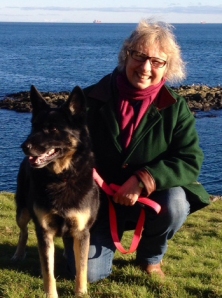What do authors think about editors? What do authors think makes the difference between a good editor and a great editor?
 In May, BoldFace asked award-winning author Elizabeth Berg about her experience working with editors. This time we posed the same questions to Nina Munteanu, a Halifax-based writing instructor and author of The Fiction Writer: Get Published, Write Now! and the short story collection Natural Selection.
In May, BoldFace asked award-winning author Elizabeth Berg about her experience working with editors. This time we posed the same questions to Nina Munteanu, a Halifax-based writing instructor and author of The Fiction Writer: Get Published, Write Now! and the short story collection Natural Selection.
Q&A conducted by Jennifer D. Foster
Overall, what’s your experience like as an author who’s been edited?
It’s been exceptional! That is, when I was being edited by professional editors. At various times in my career, I’ve had my works edited by individuals who ranged in their level of understanding of “story” and editing within the genre: colleagues, other writers, and novice editors. At times, it was disastrous. What this experience showed me was the importance of matching editor with writer. This is why in the industry we often refer to this linkage as a “marriage.” In some very important ways it is just like a marriage: a synergistic partnership of mutual respect, a shared vision, and enthusiasm with the ultimate goal of taking something and making it better. As a writer, I entrust my sacred creation to an individual who I pray will respect and uphold my voice and my vision, yet not shy away from suggesting those improvements that go beyond simple copy edits. When this happens, what you always get is something greater than what it was before. A well-matched editor and writer will together enhance a project into something beautiful. It is truly a wonderful thing to behold and experience.
What is it like as an author to work, say, months, or even years, on a book, then have an editor read it critically and suggest (sometimes major) changes?
Except for my very first book, I’ve not had an editor suggest major changes to my works…yet. However, the changes that they have suggested have always resulted in obvious improvement. I welcome the input of a good editor. In a typical edit, I find that I am in total agreement with 95 per cent of their suggestions and edits. And the remaining 5 per cent, they usually concede.
What do you think is the formula for a positive author/editor relationship?
Mutual respect and a shared vision. If the editor isn’t excited by the author’s story, they will not engage in the process with the energy necessary to deliver the story into a higher realm. This is why a good match of mutual agreement is important. Without a shared vision with the writer, the editor will not envision all the improvements possible in that particular story. Respect plays a critical role in the dialogue between writer and editor during the building process of suggestions, critical arguments, and improvements.
What’s your advice for a writer working with an editor for the first time?
Communicate openly and respectfully with your editor. Let them know clearly what your vision is. The more you communicate this, the more likely they are to share your vision, understand your work, and help you, rather than hinder or obstruct you. Remember that they are there to help you make your work even better than it already is. Concede to their wisdom in language and general story, while keeping sacred your story and your truth. On points of your truth, make them known to your editor. Argue your points respectfully and openly. The editor/writer relationship is a respectful dialogue, not a war or didactic tyranny.
What are the characteristics of a good editor? And a great one?
One who listens. “To edit well” is very much like “to listen well.” The characteristics of a good listener and a good editor are the same: respect, openness, self-assurance, wisdom, compassion, and generosity. When an editor takes on a writer’s project, they engage themselves as a counsellor, with tools in the art of storytelling to help the writer best achieve the purpose of their creation. A good editor will engage the writer respectfully; they will not demure, but assert their opinions for the sake of the project. This is an important feature of a good editor: to balance their respect for the author’s vision and voice with their assertion of sound recommendations. A great editor is both humble and wise; a mentor and student, an altruist who engages you with respect and a vision for excellence.
Jennifer D. Foster is a Toronto-based freelance editor and writer, specializing in fiction/non-fiction, custom publishing, magazines, and marketing and communication.
This article was copy edited by Alanna Brousseau.

2 thoughts on “Q&A: Author Nina Munteanu on the author/editor relationship”